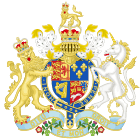Jewish Naturalisation Act 1753 facts for kids
| Act of Parliament | |

|
|
| Long title | An Act to permit Persons professing the Jewish Religion to be naturalized by Parliament; and for other Purposes therein mentioned. |
|---|---|
| Citation | 26 Geo. 2. c. 26 |
| Dates | |
| Royal assent | 7 July 1753 |
| Other legislation | |
| Repealed by | Naturalization of Jews Act 1754 |
|
Status: Repealed
|
|
| Naturalization of Jews Act 1754 | |
|---|---|
| Act of Parliament | |

|
|
| Long title | An Act to repeal an Act of the Twenty-sixth Year of His Majesty's Reign, intituled, "An Act to permit Persons professing the Jewish Religion to be naturalized by Parliament; and for other Purposes therein mentioned." |
| Citation | 27 Geo. 2. c. 1 |
| Dates | |
| Royal assent | 20 December 1753 |
The Jewish Naturalisation Act of 1753 was a special law passed in Great Britain. It allowed Jewish people living in Britain to become official citizens. This meant they could have the same rights as other British citizens. The law was approved on July 7, 1753. However, it was cancelled just one year later, in 1754. This happened because many people strongly disagreed with the new law.
Contents
Why the Jewish Naturalisation Act Was Passed
During a time called the Jacobite rising of 1745, Jewish people showed great loyalty to the British government. A key Jewish financier named Sampson Gideon helped make the country's money system stronger. Also, many young Jewish men volunteered to help defend London.
The Bill's Journey Through Parliament
Perhaps as a thank you, a politician named Henry Pelham introduced the "Jew Bill" in 1753. This bill aimed to let Jewish people become citizens by applying to Parliament. The bill first went to the House of Lords, where it passed without much trouble.
However, when it moved to the House of Commons, some politicians strongly opposed it. These politicians, known as the Tories, felt it went against Christian values. But another political group, the Whigs, believed in religious toleration. They pushed for the bill to pass.
The bill was eventually approved and became law on July 7, 1753.
Public Reaction and Repeal
After the law was passed, there was a huge wave of public anger. Many people showed strong prejudice against Jewish people. Because of this widespread opposition, the law was cancelled in the very next meeting of Parliament, in 1754.
A famous observer from that time, Horace Walpole, said the law removed "absurd distinctions." He believed it helped a group of loyal and important citizens. He also noted that even in an "enlightened" age, people still held strong prejudices.
A writer named Josiah Tucker defended the law. He wrote that allowing Jewish people to become citizens would help the economy. He explained that it would let wealthy foreigners buy land and trade more freely. This would bring in goods and raw materials, creating jobs for British people. He argued that this was the only "harm" the bill could do.
Jewish Communities in Britain
Most Sephardim Jews, who came from Spain and Portugal, gathered in London. London was a major center for international trade. However, Jewish people who came from Germany and Poland often settled in port cities. These included places like Falmouth, Plymouth, Liverpool, and Bristol.
How Communities Grew and Connected
In these port cities, many Jewish people worked as pawnbrokers or small traders. It became common for them to send out traveling sellers, called hawkers, to nearby villages every Monday. These hawkers carried goods in packs to sell. Through these connections, Jewish people began to settle in inland towns too. Some of these towns included Canterbury, Chatham, Cambridge, Manchester, and Birmingham.
These traders, though not as famous as the big merchants in London, had more direct contact with everyday English people. This interaction may have helped to reduce some of the prejudice that was so strong in 1753.
See also
- History of the Jews in England
- History of the Jews in England (1066–1290)
- Edict of Expulsion
- History of the Marranos in England
- Resettlement of the Jews in England
- Menasseh Ben Israel (1604–1657)
- Emancipation of the Jews in the United Kingdom
- Early English Jewish literature
- Rothschild family
- History of the Jews in Scotland
 | Bessie Coleman |
 | Spann Watson |
 | Jill E. Brown |
 | Sherman W. White |

